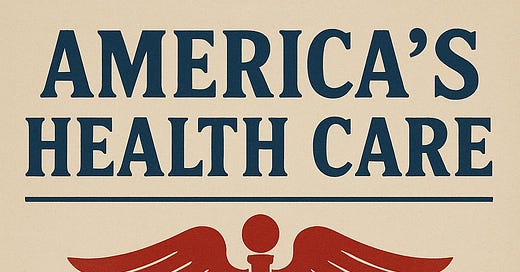You sit in a waiting room, pain gnawing at your side, the clock ticking louder than your heartbeat. You know you need surgery, but the bill from the last one still sits unopened on your kitchen table. You wait, not for healing, but for your deductible to finally be met, for the moment when you can afford to say yes to relief. This is not wellness. This is what it means to be an American in the richest country on earth, where every decision about your body is a negotiation with your bank account.
I’m writing this a day out of surgery — one I waited months to schedule because I had to reach my deductible first and pay off medical bills. Even now, as I recover, I’m still worried about the bills that will follow, wondering how much healing I can afford.
Across the border in Canada, someone with the same pain walks into a clinic, shows a health card and is scheduled for surgery — no questions about payment, no fear of debt. In France, a mother brings her feverish child to the doctor and worries only about comfort, not cost. In America, we ration care, delay treatment, and pray we don’t get sick before payday.
America’s Health Care: The Most Expensive, Not the Best
Average U.S. health care spending: $12,914 per person per year — more than double the average for other wealthy countries.
Outcomes: Americans have shorter life expectancies and higher rates of preventable disease and death compared to peers in Canada, Germany or the UK.
Access: 1 in 4 Americans say they or a family member have skipped care due to cost in the past year.
What HR 1 (“One Big Beautiful Bill”) Will Do to Your Health Care
Here’s how HR 1 will reshape American health care:
1. Deep Cuts to Medicaid
Over $1 trillion slashed from Medicaid over a decade, the largest rollback in history.
Up to 17 million Americans could lose coverage, including children, seniors, people with disabilities and working families.
New work requirements and paperwork hurdles will push millions off the rolls, even if they’re sick or caring for family.
2. Dismantling the Affordable Care Act
Ends enhanced tax credits that made marketplace insurance affordable for 24 million people.
Eliminates automatic re-enrollment, making it easier to lose coverage by missing a deadline.
Destabilizes insurance markets, driving up premiums and forcing insurers out of rural and underserved areas.
3. Ripple Effects on Everyone
Hospitals, especially rural ones, will close or cut services as Medicaid payments disappear.
Employer-sponsored insurance costs will rise as more people lose public coverage and hospitals shift costs to private plans.
Doctors and nurses will be stretched thinner, facing more burnout and less ability to care for patients.
4. Who Gets Hurt Most?
Children, the elderly and disabled Americans will lose vital coverage.
Working families will face impossible choices between care and bills.
Communities of color and rural areas—already facing health deserts—will be hit hardest.
Why Make Health Care Worse?
Motivation: Profit, power and policy.
Cutting costs for the wealthy: HR 1’s health cuts are paired with tax breaks for corporations and the richest Americans. The money saved from slashing Medicaid and ACA subsidies is funneled upward.
Privatization: The bill’s architects believe public health is a burden, not a duty. By making care harder to get, it pushes people toward private insurance or leaves them with nothing.
Political calculation: By making Medicaid and ACA coverage harder to access, politicians can claim to have “reduced spending,” even as millions lose care and costs rise for everyone else.
HR 1 is not about health; it’s about money and power. It’s about writing off the sick and the struggling so that those with the most can keep more. It’s about turning health from a promise into a privilege.
The American Dilemma
You shouldn’t have to wait half a year and two surgeries to finally afford to heal. You shouldn’t have to wonder if a cough will cost you your home. In America, we are forced to make health decisions based on every penny in our wallet. HR 1 will make that cruel calculus even harsher.
We deserve a country where health is a right, not a reward for the lucky. Until then, we ration care, we stretch hope and we count every bill, while the system counts its savings.
Key Sources:Kaiser Family Foundation: Health Care Affordability Survey 2024
Commonwealth Fund: 2023 International Health Policy Survey
Health Affairs: High-Deductible Health Plans and Delayed Care
NPR: Americans Delaying Medical Care Due to Cost
Government of Canada: Health Care System Overview
French Ministry of Health: Universal Health Coverage
OECD Health Statistics 2024
World Bank: Life Expectancy Data
Center on Budget and Policy Priorities: HR 1 Medicaid Cuts
Congressional Budget Office: HR 1 Coverage Loss Estimates
Kaiser Family Foundation: Medicaid Work Requirements
Families USA: ACA Tax Credit Changes
Urban Institute: Effects of Ending Automatic Re-Enrollment
Modern Healthcare: Rural Hospital Closures
American Hospital Association: Medicaid and Hospital Stability
Peterson-KFF: Cost-Shifting in Employer Insurance
Medscape: Physician Burnout and Health Policy
National Rural Health Association: Impact of Medicaid Cuts
Americans for Tax Fairness: HR 1 Tax Cuts Analysis
Brookings Institution: Privatization and Health Policy






It’s the same with education thanks to Reagan 🤮. We are the only country in the world with paid education and unaffordable student loans. Between that and what is being done to healthcare, we are screwed—unless of course we have huge assets and investments…